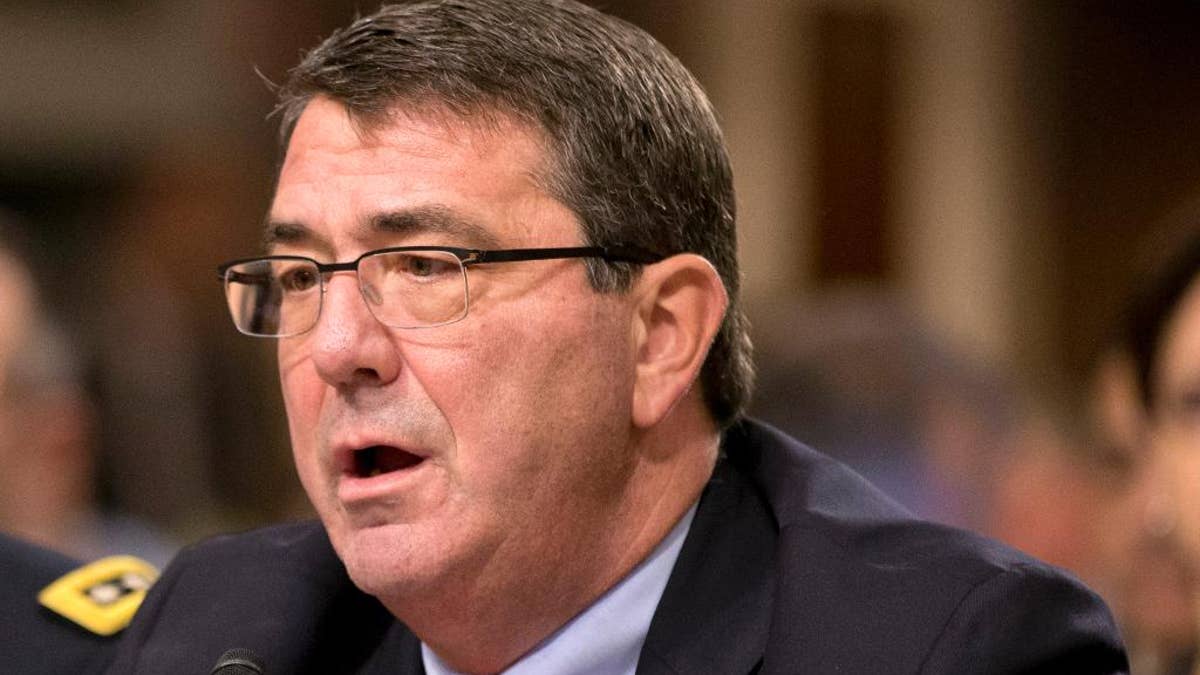
FILE - In this Feb. 12, 2013 file photo, Ashton Carter testifies on Capitol Hill in Washington. People familiar with the decision-making process say President Barack Obama’s shortlist for Defense Secretary includes Carter, the former deputy defense secretary who left the administration in late 2013, and Robert Work, who currently holds the No. 2 job at the Pentagon. The president has also been considering Homeland Security Secretary Jeh Johnson, who previously served as the Pentagon’s top lawyer, though some administration officials are concerned about leaving a vacancy at DHS just as the agency starts implementing Obama’s immigration executive actions. (AP Photo/J. Scott Applewhite, File) (The Associated Press)
WASHINGTON – When Ashton Carter took up duties as the Pentagon's second-ranking official three years ago he described his role as "alter ego" to his boss, then-Defense Secretary Leon Panetta, whose public profile had been boosted by his role in planning the raid that killed Osama bin Laden.
If Carter, a relative unknown on the national stage, is nominated as President Barack Obama's fourth Pentagon chief, he will be thrust out of his comfort zone as a behind-the-scenes confidante. If confirmed, he'd be at the center of more defense and foreign policy problems, arguably, than Panetta faced in his 20 months as defense secretary.
When Chuck Hagel abruptly resigned under White House pressure on Nov. 24 after less than two years as defense secretary, Carter's name was among the first to surface as a potential successor.
That is largely because of his academic and government credentials and his reputation as one of the brightest minds in the national security establishment.
And because the more obvious choices to replace Hagel, including Sen. Jack Reed, D-R.I., and former Pentagon executive Michele Flournoy, who would have been the first woman to serve as defense secretary, took themselves out of the running.
Administration officials say Carter is at the top of the short list, though no final decision has been made.
Carter has extensive experience in the national security arena. Before he served as deputy defense secretary from October 2011 to December 2013 he was the Pentagon's technology and weapons-buying chief for more than two years.
During the administration of President Bill Clinton he was assistant secretary of defense for international security policy. Before that he was director of the Center for Science and International Affairs at Harvard University's John F. Kennedy School.
His academic credentials are exceptional. He has bachelor's degrees in physics and medieval history from Yale University and received his doctorate in theoretical physics from Oxford University, where he was a Rhodes Scholar. He has served on the advisory boards of MIT's Lincoln Laboratories and the Draper Laboratory. He has extensive knowledge of the inner workings of the U.S. nuclear arsenal.
Carter's academic record is such that Gen. Martin Dempsey, chairman of the Joint Chiefs of Staff, jokingly noted at Carter's farewell ceremony that he has been called an "uber-wonk" and that in Hollywood circles he would be considered "not hot." But Dempsey said Carter had earned respect far and wide.
"It's lucky for us that you have worked without glamour or fame behind the scenes to make sure through good management and common sense and discipline that we are an organization that continues to adapt to the challenge that we find in front of us," Dempsey told Carter at his farewell. "He did it all again without fanfare. In fact, I think he's been called the most important, least known figure in Washington, or some language to that effect, and I agree with that."
In national security circles Carter is closely associated with a concept he and former Defense Secretary William Perry championed in the 1990s. They called it "preventive defense." Its basic premise is that in the aftermath of the Cold War the U.S. could forestall major new security threats by using defense diplomacy — forging and strengthening security partnerships with China, Russia and others.
Carter's view of U.S. defense priorities appears to fit well with the Obama agenda, including better minding of defense alliances and partnerships in Asia and the Pacific, as well as more attention on cyberdefense and countering the spread of weapons of mass destruction.
In remarks in July 2013 at the Aspen Security Forum, Carter said the country was ready to move beyond the wars in Iraq and Afghanistan and to look harder at future threats, including cyberattacks. That was one month before Obama announced the start of a bombing campaign against the Islamic State group in Syria and Iraq.
Carter's point was that the Pentagon had entered an era of transition that requires fresh thinking. He said that effort could be stymied by across-the-board budget cuts in 2016 if Congress does not act to erase the budget-cutting law called sequestration.
"First of all, we need to get back to some issues that we've taken our eye off a little bit over the last decade," he said, adding, "We need to reinvest and get back in the game."
___
AP White House Correspondent Julie Pace contributed to this report.

